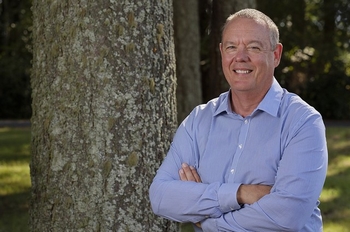Missing the biopilot bridge between science and commercialisation

We know how crucial science is to informing New Zealand’s COVID-19 response and recovery phases. The next phase – rebuild – needs to look long term and have bold aspirations that address the global challenges we face, such as climate change, non-sustainable production processes and environmental degradation.
In my last editorial I talked about the future opportunities for New Zealand if we purposefully shape the post-COVID-19 rebuild to bring about better social, environmental and economic outcomes for our people and the place we call home. A key aspect of delivering on these opportunities is the link between research – in this case Scion research – and its adoption.
The rebuild Scion is championing is one that will transform our industries. By 2030, we want to see new biobased industries that use materials derived from tree- and wood-waste up and running, replacing those relying on imported chemicals and fuels.
Can we realise this in a decade? I believe we can. With the will and the means, our innovative, agile country should be able to move from the linear ‘take, make, waste’ model of production and consumption to a model based on circular bioeconomy principles.
The ‘will’ is there. Consumers are increasingly wanting sustainable and environmentally friendly production practices, and policy and regulatory frameworks are reflecting public expectations. However, the ‘means’ to enable emergence of bioindustries is a barrier. There’s a key gap in the New Zealand innovation system that is constraining new bioproduct development. We can carry-out promising lab-scale development, but lack of pilot-scale facilities that allow the scale-up of technologies using new biomaterials makes it hard to prove commercial viability and attract investors.
Around the world, pilot facilities are key infrastructure in the step up to establishing commercial operations. They operate as open-access research and demonstration facilities enabling new and existing businesses to de-risk, advance, prove and scale-up innovative products.
If New Zealand is to embrace the transition to a circular bioeconomy, and join the rapidly developing global trend, we must recognise the need to invest in specific technologies required for reprocessing and substitution of petrochemical materials with biobased alternatives.
Nowhere in the world have such new industry opportunities been substantially realised without an enabling innovation ecosystem that includes open-access pilot plant facilities. And in the global landscape numerous pilot plant facilities are almost exclusively funded by governments in the national interest.
Critical to the establishment of and supporting ecosystem for such a nationally significant asset is secure funding from a partner, or partners, with the capacity and breadth of interest to make it happen and commitment from industry to utilise pilot-scale facilities.
A national cluster of scale-up facilities (a biopilot centre) attached to the Scion research facility here in Rotorua will unlock new manufacturing opportunities for high-value products made in regions with abundant biomass (such as forestry and other primary industries). Opportunities are significant for waste reprocessing, bioproduct development and maximising value from primary industry feedstocks. An independent report indicates the creation of thousands of jobs through establishing new manufacturing operations and industries¹.
Te Papa Tipu Innovation Park in Rotorua is an ideal location for a national biopilot centre. The park is the home of Scion and 30 other linked business partners, is close to forestry, other primary sector resources and waste streams, has Toi Ohomai Institute of Technology nearby and is emerging as the hub for forestry and high-tech materials companies.
Scion has received wide support for a biopilot centre, and we are now looking to bring in partners, whether they be partners to use the facility, equipment suppliers to have their equipment used or funding partners.
Successful implementation of this key piece of national infrastructure will provide a legacy impact for New Zealand supporting significant new business opportunities and employment throughout the country.
If you want to be part of creating a national asset to grow a whole new primary industry for New Zealand please let me know of your interest at any level.

Dr Julian Elder
Chief Executive
For further information contact
Dr Julian Elder
